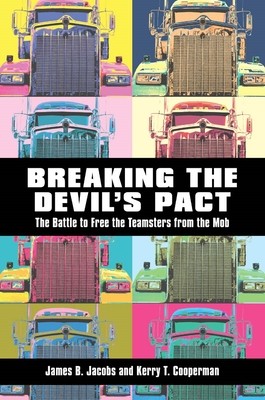
- We will send in 10–14 business days.
- Author: James B Jacobs
- Publisher: New York University Press
- ISBN-10: 0814743080
- ISBN-13: 9780814743089
- Format: 15.8 x 23.4 x 3.1 cm, hardcover
- Language: English
- SAVE -10% with code: EXTRA
Reviews
Description
An in-depth study of the U.S. v. the International Brotherhood of Teamsters
In 1988, Manhattan U.S. Attorney Rudy Giuliani brought a massive civil racketeering suit against the leadership of the International Brotherhood of Teamsters (IBT), at the time possibly the most corrupt union in the world. The lawsuit charged that the mafia had operated the IBT as a racketeering enterprise for decades, systematically violating the rights of members and furthering the interests of organized crime. On the eve of trial, the parties settled the case, and twenty years later, the trustees are still on the job. Breaking the Devil's Pact is an in-depth study of the U.S. v. IBT, beginning with Giuliani's lawsuit and the politics surrounding it, and continuing with an incisive analysis of the controversial nature of the ongoing trusteeship. James B. Jacobs and Kerry T. Cooperman address the larger question of the limits of legal reform in the American labor movement and the appropriate level of government involvement.EXTRA 10 % discount with code: EXTRA
The promotion ends in 7d.12:20:22
The discount code is valid when purchasing from 10 €. Discounts do not stack.
- Author: James B Jacobs
- Publisher: New York University Press
- ISBN-10: 0814743080
- ISBN-13: 9780814743089
- Format: 15.8 x 23.4 x 3.1 cm, hardcover
- Language: English English
An in-depth study of the U.S. v. the International Brotherhood of Teamsters
In 1988, Manhattan U.S. Attorney Rudy Giuliani brought a massive civil racketeering suit against the leadership of the International Brotherhood of Teamsters (IBT), at the time possibly the most corrupt union in the world. The lawsuit charged that the mafia had operated the IBT as a racketeering enterprise for decades, systematically violating the rights of members and furthering the interests of organized crime. On the eve of trial, the parties settled the case, and twenty years later, the trustees are still on the job. Breaking the Devil's Pact is an in-depth study of the U.S. v. IBT, beginning with Giuliani's lawsuit and the politics surrounding it, and continuing with an incisive analysis of the controversial nature of the ongoing trusteeship. James B. Jacobs and Kerry T. Cooperman address the larger question of the limits of legal reform in the American labor movement and the appropriate level of government involvement.

Reviews